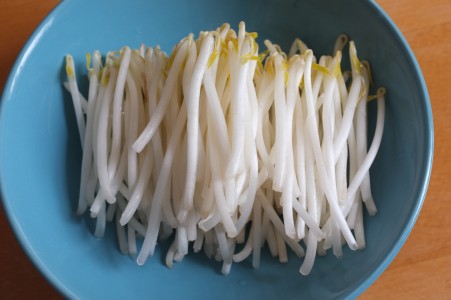When people talk about Beansprouts they usually mean the plump, silver-white sprouts of the mung bean (Vigna radiata), which have been cultivated for 5,000 years and the Chinese call nga choi. Beansprouts are most familiar in Chinese and Southeast Asian cuisines.

Growing
Processing and Packing
Distribution
We have a fleet of refrigerated vehicles and also use 3rd party transport companies for full flexibility.
Food safety is actively managed and of paramount importance at J. Pao. From seed to shelf, we are able to guarantee our Beansprouts are produced under the strictest conditions, unsurpassed by any other manufacturer. Our production facility complies with or exceeds EU Health & Safety regulations, and is regularly inspected and audited.
Procedures at every stage of production ensure our Beansprouts remains free from microbiological, chemical or physical contamination. Laboratory screening is undertaken on a daily basis, and the packaging process is under constant visual and electronic surveillance to detect foreign objects. All our seeds are certified to be GM-free.
We maintain close links with the Food Standards Agency (UK) and the Advisory Committee on the Microbiological Safety of Food (UK).
Beansprouts contain more concentrated and digestible nutrition than the dry mung bean. Once germinated, many complex processes begin: saturated fats become unsaturated, proteins are broken down into their component amino acids and starchy carbohydrates are converted into more digestible oligosaccharides. Perhaps the most remarkable process during germination is the synthesis of vitamins, minerals and other health-promoting substances.
NUTRITIONAL VALUE
Beansprouts have a high nutritional value, each 100g serving providing 6.18g total carbohydrate, 3.16 g protein and 1.9 g of dietary fibre, whilst containing only 31 calories, extremely low sodium and zero cholesterol. Beansprouts contain 8 of the essential amino acids and are a source of omega-3 (17mg) and omega-6 fatty acids (44mg).
VITAMINS
Several essential vitamins are available in the same 100g serving of Beansprouts. These include Vitamin K (34µg), Vitamin C (14mg) and folic acid (60µg or 15% of RDA). Other vitamins (up to 8% RDI) are also available, including (in descending order) riboflavin, thiamine, Vitamin B6 (pyridoxine), niacin, pantothenic acid and Vitamin E.
MINERALS
Important dietary minerals are also found in Beansprouts. Significant amounts of both copper and manganese can be found, each at around 10% RDI. Other minerals are also available (up to 9% RDI), such as phosphorous, iron, magnesium, potassium, zinc, calcium and selenium.
Reference: USDA National Nutrient Database
Today, in East and West, beansprouts continue to be studied by medical researchers focused on: ageing; hair, skin & nails; digestion; depression & anxiety; fertility & menopause; glycaemic control; and cancer.


